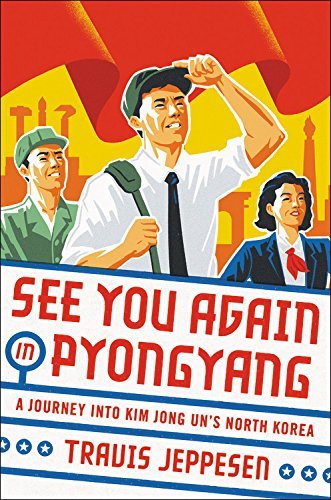What do you think?
Rate this book


304 pages, Hardcover
First published May 29, 2018
See You Again in Pyongyang: A Journey into Kim Jong Un’s North Korea by Travis Jeppesen documented the author’s month-long trip to the country in 2016 where he studied the Korean language at Kim Hyong Jik University of Education in Pyongyang. Jeppesen was the first American to study at a North Korean university, yet was no stranger to the country, as he had visited the DPRK on four previous, yet shorter, trips.
I took an immediate liking to this book, as I could identify with Jeppesen. We are both queer language lovers who have visited the DPRK, and I shared many of the same experiences during my lengthy trip to the country in 2011. His remark about tourists was precise, especially considering that I have a desire to return to the country to study the language just as he did:
“It seems strange. Then again, everything is a bit strange here. Not just the place but the people–and not just the local people but the tourists who willingly choose to come here. And especially, it follows, the ones like us–the moths who keep flocking back to the flame, overtaken by the mystery.”
Whether I was reading between the lines or tuning into my astute gaydar when looking at Jeppesen’s photo on the end flap, I could pick up on the sexual orientation of the author way before he came out on page 201. While in the DPRK Jeppesen and I both had to endure questions rooted in heteronormativity about our personal lives. I was asked on many occasions if I had a wife back home in Canada. Creating a closet for myself, and inventing ex-girlfriends to tell my minders about was humiliating for my self-esteem. I reasoned that countries that have dismal human rights records usually don’t treat their LGBT citizens well either, so I hid in the closet to save my skin. For the rest of the trip I genuinely worried that I might get into trouble if they should find out that I had been lying.
Although the author was a student with homework (yet no other classmates) he also partook in regular excursions throughout the country with students enrolled at different language levels. What I found endearing about Jeppesen was his empathy towards the North Korean people and nation. He didn’t turn his travel and educational experiences into a Stalinist freakshow diary wherein he ridiculed everyone and everything from his American pulpit. We both went to the DPRK with the same purpose: to observe, learn and listen. I was on a personal mission of “chocolate diplomacy”, using Toblerone to bridge the divide between our nations. I took some heat from a small minority of friends who accused me of contributing to Kim Jong Il’s nuclear program through my travel fees. No amount of explaining my reasons for visiting the country could convince them otherwise. Yet I believe that Jeppesen and I had the same desire to see the country for ourselves, and while we were both led along planned itineraries always with guides, when you travel throughout the entire country as I did for nineteen days, there is plenty that you see that is not part of any planned excursion and the “off-script” encounters tell the real story.
Jeppesen interspersed episodes of Korean history within the text. This helped to explain certain situations and I commend the author for making it interesting, yet because I have read so much about Korea already I felt that these sections slowed down the text. This is not a criticism but rather a case of encountering the same histories yet again.
I had a laugh at the progressive levels of exasperation that foreign residents of the country have:
“Seven European countries have diplomatic missions in the DPRK, while two more have ‘cooperation offices.’ I fall into conversation with one weathered ambassador. ‘In my experience,’ he says, ‘the embassy people working here tend to go through three phases. The first is where you think you finally get it and understand how this country really operates. The second, where you get frustrated and realize you don’t understand anything. And the last is when you realize you don’t understand anything and no longer care because you’ll be out of here soon.'”
The author wrote about defectors and their hardships in learning to adapt to a new way of life in South Korea. He is critical of those who have taken on the role as professional defectors and social media stars. While he did not name Yeonmi Park directly, I knew immediately that he was referring to her. In her struggle to make it in free South Korea, Park has sadly taken her self-promotion to the level of virtual prostitution, painting herself as the quintessentially girlish yet sexually starved eastern goddess. Check out her YouTube videos where she coos like Angelyne and practically solicits herself to men whose fetish is to sleep with “unattainable” women. I even travelled with at least one such (admitted) tourist in 2011; his sexual bucket list included bedding a North Korean woman.
Jeppesen visited the DPRK only after Kim Jong Un took power while my visit preceded the death of Kim Jong Il by only a few months. If I do return to the country, should it reopen after COVID, I wonder what will be different. I can at least prepare myself in advance of any Korean language class, even though I would be enrolling as a beginner.